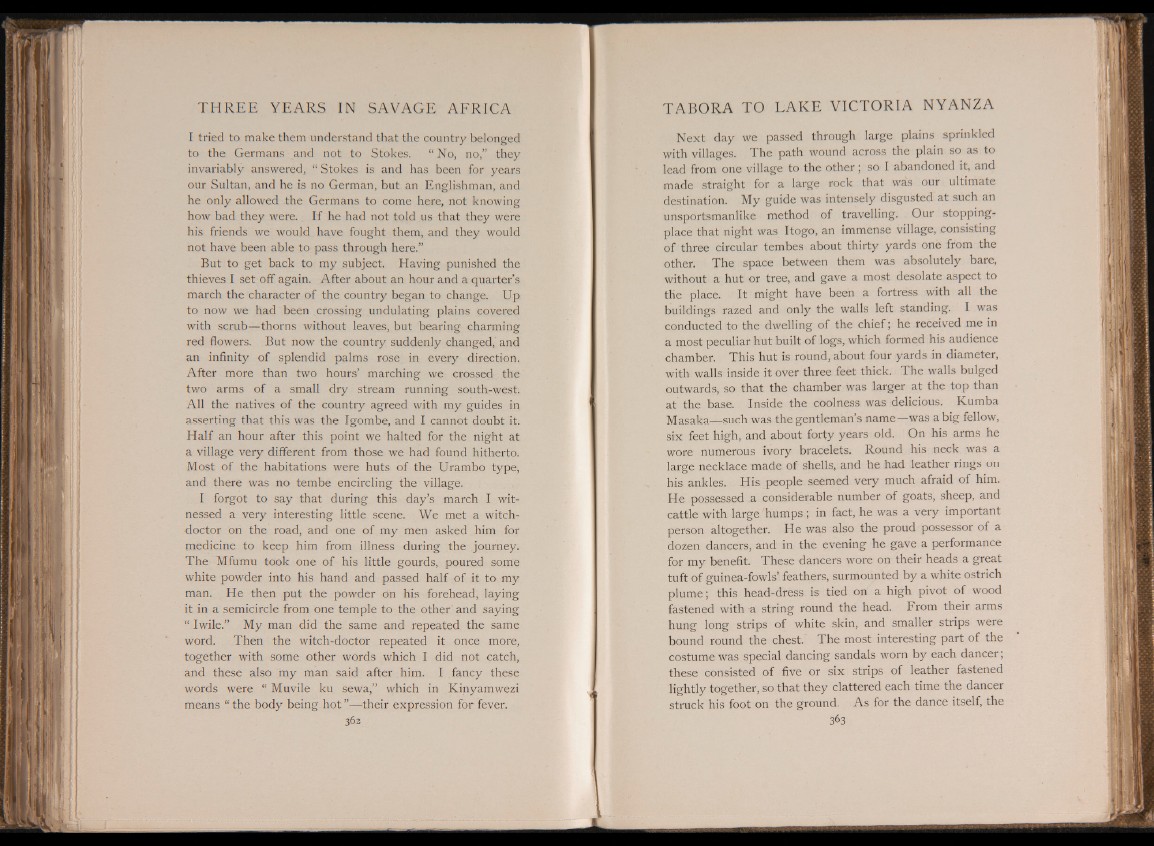
I tried to make them understand that the country belonged
to the Germans and not to Stokes. “ No, no,” they
invariably answered, “ Stokes is and has been for years
our Sultan, and he is no German, but an Englishman, and
he only allowed the Germans to come here, not knowing
how bad they were. If he had not told us that they were
his friends we would have fought them, and they would
not have been able to pass through here.”
But to get back to my subject. Having punished the
thieves I set off again. After about an hour and a quarter’s
march the character of the country began to change. Up
to now we had been crossing undulating plains covered
with scrub—thorns without leaves, but bearing charming
red flowers. But now the country suddenly changed, and
an infinity of splendid palms rose in every direction.
After more than two hours’ marching we crossed the
two arms of a small dry stream running south-west.
All the natives of the country agreed with my guides in
asserting that this was the Igombe, and I cannot doubt it.
Half an hour after this point we halted for the night at
a village very different from those we had found hitherto.
Most of the habitations were huts of the Urambo type,
and there was no tembe encircling the village.
I forgot to say that during this day’s march I witnessed
a very interesting little scene. We met a witchdoctor
on the road, and one of my men asked him for
medicine to keep him from illness during the journey.
The Mfumu took one of his little gourds, poured some
white powder into his hand and passed half of it to my
man. He then put the powder on his forehead, laying
it in a semicircle from one temple to the other and saying
“ Iwile.” My man did the same and repeated the same
word. Then the witch-doctor repeated it once more,
together with some other words which I did not catch,
and these also my man said after him. I fancy these
words were “ Muvile ku sewa,” which in Kinyamwezi
means “ the body being hot ”—their expression for fever.
362
Next day we passed through large plains sprinkled
with villages. The path wound across the plain so as to
lead from one village to the other; so I abandoned it, and
made straight for a large rock that was our ultimate
destination. My guide was intensely disgusted at such an
unsportsmanlike method of travelling. Our stopping-
place that night was Itogo, an immense village, consisting
of three circular tembes about thirty yards one from the
other. The space between them was absolutely bare,
without a hut or tree, and gave a most desolate aspect to
the place. It might have been a fortress with all the
buildings razed and only the walls left standing. I was
conducted to the dwelling of the chief; he received me in
a most peculiar hut built of logs, which formed his audience
chamber. This hut is round, about four yards in diameter,
with walls inside it over three feet thick. The walls bulged
outwards, so that the chamber was larger at the top than
at the base. Inside the coolness was delicious. Kumba
Masaka—such was the gentleman’s name—was a big fellow,
six feet high, and about forty years old. On his arms he
wore numerous ivory bracelets. Round his neck was a
large necklace made of shells, and he had leather rings on
his ankles. His people seemed very much afraid of him.
He possessed a considerable number of goats, sheep, and
cattle with large humps ; in fact, he was a very important
person altogether. He was also the proud possessor of a
dozen dancers, and in the evening he gave a performance
for my benefit. These dancers wore on their heads a great
tuft of guinea-fowls’ feathers, surmounted by a white ostrich
plume; this head-dress is tied on a high pivot of wood
fastened with -a string round the head. From their arms
hung long strips of white skin, and smaller strips were
bound round the chest. The most interesting part of the
costume was special dancing sandals worn by each dancer;
these consisted of five or six strips of leather fastened
lightly together, so that they clattered each time the dancer
struck his foot on the ground. As for the dance itself, the
363